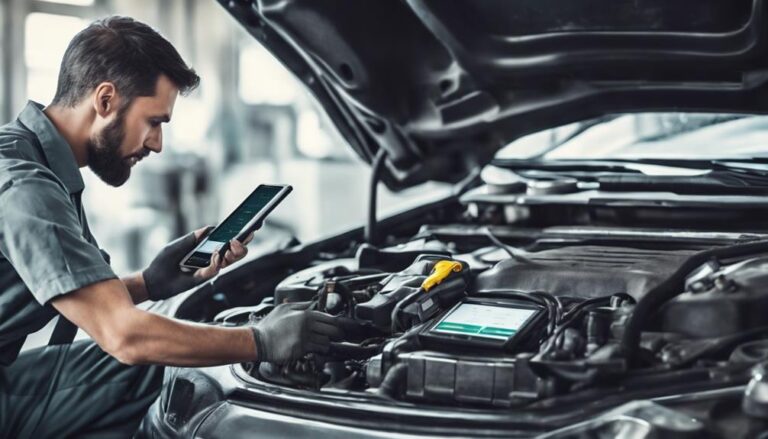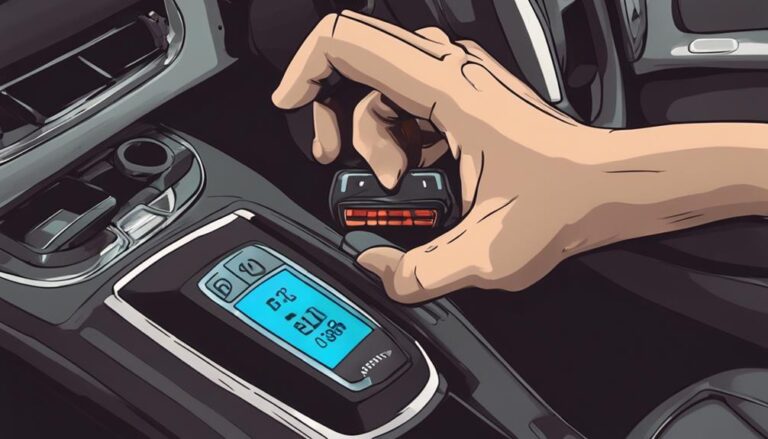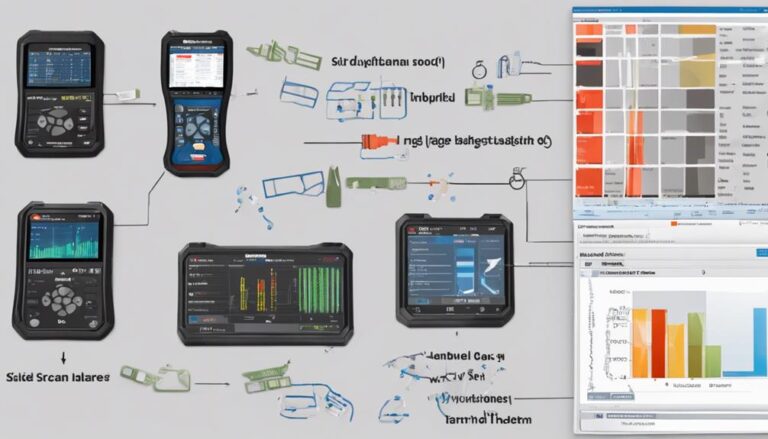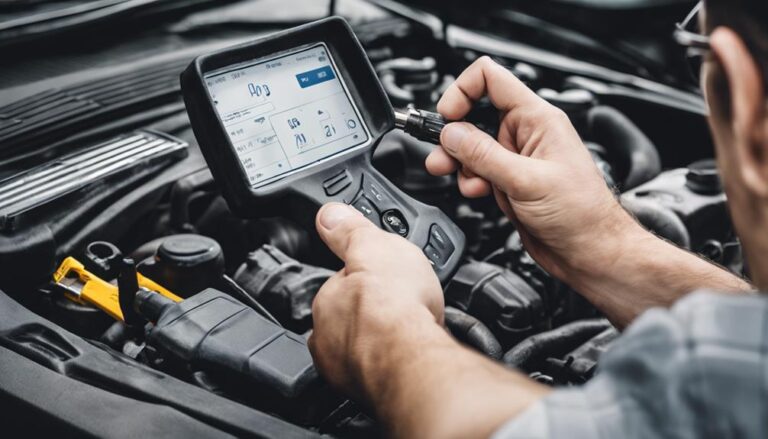7 Essential Tips for Immediate Engine Check Importance
So, you've decided to play a little game of chance with your check engine light, huh? Well, let's see how that pans out for you.
But before you start pondering your luck, let's chat about the 7 essential tips that could save you from some major headaches down the road.
Trust me, you'll want to pay attention to these pointers if you value your vehicle's well-being and your wallet.
Key Takeaways
- Immediate engine check prevents costly repairs and breakdowns.
- Understanding the check engine light's meaning is vital for prompt action.
- Quick response to the light ensures optimal engine performance.
- Timely maintenance reduces occurrences of the check engine light.
Importance of Immediate Engine Check
When the check engine light illuminates on your dashboard, immediate engine check is vital to prevent costly repairs and potential breakdowns. Ignoring this warning can lead to significant repair costs and even result in your vehicle breaking down unexpectedly.
Timely attention to maintenance reminders and addressing the check engine light promptly can help maintain your vehicle's performance and prevent further damage to its components. Regular maintenance is key to reducing the occurrences of the check engine light and ensuring optimal vehicle operation.
Understanding Check Engine Light
When the check engine light illuminates in your vehicle, it serves as a warning that the onboard diagnostics system has detected a potential issue with the engine's performance.
Common causes for this light include issues with the emission control system, fuel system, or ignition system.
Immediate action is necessary to prevent further damage and ensure optimal engine performance.
Light Meaning
The check engine light serves as a crucial yellow warning indicator that signifies potential engine or emissions issues. Understanding its meaning is vital for prompt action. Here are some key points to consider:
- Differentiation: It differs from oil or battery lights, specifically addressing engine-related concerns.
- Fault Detection: The light illuminates when the car's computer system detects a fault, indicating the need for attention.
- Response Importance: Promptly addressing issues highlighted by the light can prevent performance decline and emissions increase.
- Potential Consequences: Ignoring the light may lead to reduced vehicle performance, increased emissions, and even damage.
- Actionable Insight: Knowing what triggers the light provides valuable diagnostic codes for efficient problem-solving.
Common Causes
To understand common causes behind the check engine light activation, it is crucial to recognize that various issues such as a loose gas cap, faulty oxygen sensor, catalytic converter problems, ignition coil malfunctions, and mass airflow sensor issues can trigger this warning indicator. Faulty sensors and problems related to emission control are often at the root of these issues. Here is a breakdown of some common causes:
| Common Causes | Description |
|---|---|
| Loose Gas Cap | Allows excess air into the fuel system leading to erratic readings. |
| Faulty Oxygen Sensor | Monitors oxygen levels in the exhaust for optimal fuel efficiency. |
| Catalytic Converter Issues | Converts harmful pollutants into less harmful emissions. |
Immediate Action
For efficient troubleshooting of your vehicle's check engine light, immediate action is crucial to prevent potential damage. Quick response to the check engine light is vital for maintaining optimal engine health. Here are five essential steps to consider:
- Check for any other warning lights or unusual vehicle behavior.
- Ensure the gas cap is securely fastened, as a loose cap can trigger the light.
- Avoid continued driving if the check engine light is flashing, as this indicates a severe issue.
- Use a diagnostic scan tool to retrieve trouble codes and pinpoint the problem area.
- Seek professional assistance promptly to address the underlying cause and prevent further damage to your vehicle.
Diagnostic Tools and Techniques
Utilize diagnostic scan tools to efficiently pinpoint engine issues by reading trouble codes from the car's computer. These tools offer diagnostic accuracy and troubleshooting efficiency, enabling you to identify the root cause of the check engine light promptly.
Professional mechanics rely on specialized diagnostic equipment to accurately diagnose and repair engine problems based on real-time data and code reports provided by the vehicle's onboard diagnostics systems. Even as a car owner, you can benefit from free code scans available at many auto parts stores, helping you understand the specific problem triggering the check engine light.
Addressing Common Engine Issues
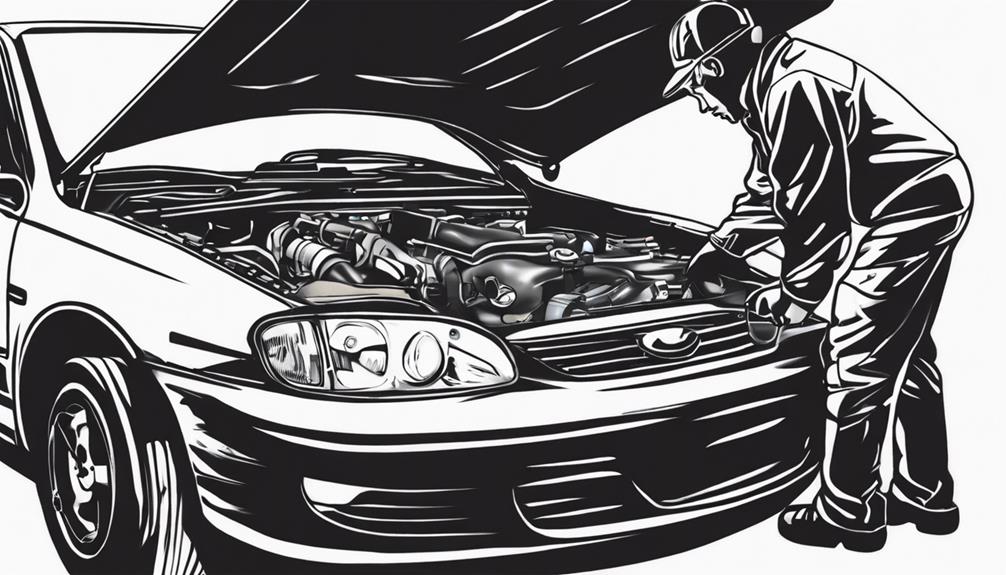
When addressing common engine issues, understanding the potential triggers behind the check engine light is crucial for effective troubleshooting and maintenance. Here are some common solutions and quick fixes to address issues that may cause the check engine light to illuminate:
- Tighten the Gas Cap: A loose gas cap is a frequent culprit for triggering the check engine light. Ensure the gas cap is securely tightened after refueling.
- Check Oxygen Sensors: Faulty oxygen sensors can lead to the illumination of the check engine light. Replace any malfunctioning sensors to rectify this issue.
- Inspect the Catalytic Converter: Issues with the catalytic converter may cause the check engine light to come on. A professional inspection can determine if repair or replacement is necessary.
- Address Ignition Coil Problems: Ignition coil problems can be a reason for the check engine light activation. Replace any faulty ignition coils to resolve this issue.
- Evaluate Mass Airflow Sensors: Malfunctioning mass airflow sensors are known to trigger the check engine light. Cleaning or replacing these sensors can often rectify the problem efficiently.
Timely Professional Assistance
Seeking timely professional assistance when the check engine light illuminates is crucial to prevent further vehicle damage and accurately identify underlying issues. When faced with this situation, an emergency response from a qualified mechanic is essential.
Professional mechanics possess the expertise to conduct a quick diagnosis using specialized diagnostic tools that read trouble codes stored in the car's computer system. This quick diagnosis ensures that the root cause of the issue is pinpointed accurately. By relying on their expertise in engine diagnostics, mechanics can provide precise repairs and maintenance tailored to your vehicle's needs.
Promptly seeking professional help not only saves time but also money in the long run by preventing potential extensive damage. Therefore, when your check engine light comes on, don't hesitate to reach out to a professional for immediate assistance to address the issue effectively.
Safety Considerations and Risks

Ignoring the check engine light poses significant safety risks and potential damage to your vehicle's engine and emission system. Addressing this warning sign promptly is crucial to avoid further complications. Here are some safety precautions and warning signs to consider:
- Sudden Breakdown Risk: Ignoring the check engine light increases the likelihood of a sudden breakdown, leaving you stranded and at risk of accidents.
- Emission System Problems: Failure to act on the warning may lead to emission system issues, causing harm to the environment and potentially resulting in fines.
- Engine Damage: Continued neglect of the check engine light can lead to severe engine damage, requiring costly repairs or even engine replacement.
- Voided Warranties: Some warranties may become void if the check engine light is disregarded, leaving you responsible for all repair expenses.
- Reduced Fuel Efficiency: Ignoring the warning light can result in reduced fuel efficiency, costing you more money in the long run.
Regular Maintenance for Prevention
Regular maintenance is crucial for preventing check engine light issues.
Ensure you adhere to the manufacturer's schedule for tune-ups, oil changes, and air filter replacements.
Following these preventive measures can significantly reduce the likelihood of encountering unexpected engine problems.
Preventive Maintenance Benefits
Maintaining your vehicle through regular preventive maintenance can significantly reduce the risk of unexpected breakdowns and costly repairs. To maximize the benefits of preventive measures, consider the following:
- Set maintenance reminders for oil changes, tune-ups, and other crucial services.
- Timely oil changes and tune-ups enhance engine performance and durability.
- Regularly checking fluid levels helps prevent overheating and potential engine damage.
- Replace air filters as recommended by the manufacturer to ensure efficient fuel combustion.
- Adhering to the manufacturer's maintenance schedule can help prevent triggering the check engine light.
Importance of Check-Ups
A critical aspect in ensuring your vehicle's optimal performance and longevity involves adhering to scheduled check-ups for preventive maintenance. Regular maintenance check-ups play a crucial role in preventing potential issues that may trigger the check engine light. By following the manufacturer's maintenance schedule, you can avoid costly repairs and breakdowns. Timely oil changes and fluid checks are essential to keep the engine running smoothly. Replacing air filters as recommended can significantly improve engine performance and reduce the chances of the check engine light coming on. Routine tune-ups are essential preventive measures that help catch minor problems before they escalate. Consistent maintenance benefits your vehicle by enhancing performance and reliability, ultimately saving you time and money in the long run.
| Preventive Measures | Maintenance Benefits | Importance |
|---|---|---|
| Regular check-ups | Prevent potential issues | Ensures optimal performance |
| Following schedule | Avoid costly repairs | Enhances longevity |
| Timely oil changes | Smooth engine operation | Saves money |
| Air filter replacements | Improved engine performance | Reduces breakdown risks |
Frequently Asked Questions
Why Is It Important to Check the Engine Light?
Checking the engine light is crucial for maintenance and troubleshooting. Ignoring it can lead to significant issues. Addressing it promptly is vital. Regular checks help prevent breakdowns. Seeking professional help ensures the vehicle's health and performance.
What 2 Steps Should a Driver Take When a Check Engine Light Comes On?
When the check engine light illuminates, first use diagnostic tools like an OBD-II scanner for trouble codes. Next, consider consulting a mechanic for professional repair options. Don't delay in addressing these critical steps for your vehicle's well-being.
What Is the First Thing That One Should Check if an Engine?
When your engine light comes on, first check the fuel filter for clogs and the spark plugs for wear. Ignoring these can cause performance issues. Keep your engine running smoothly by addressing these components promptly.
What to Do When an Engine Check?
When the engine check light comes on, start by using diagnostic tools like an OBD-II scanner to retrieve error codes. If unsure, seek mechanic consultation for accurate diagnosis and proper repair. Don't delay!
Conclusion
In conclusion, when the check engine light comes on, you must act promptly to avoid potential damage to your vehicle. Ignoring the warning signs is like driving blindfolded through a minefield – a dangerous gamble that can result in costly repairs.
Stay proactive, address issues immediately, and maintain your vehicle regularly to ensure smooth and efficient performance. Remember, the check engine light is your car's way of signaling for help – don't ignore it.


